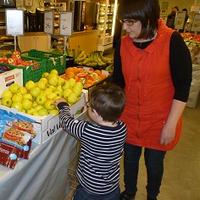5C I butikken
5C Im Laden
5C In the store
5C En magasin
5C В магазині
Cecilie og Alex er i butikken.
Cecilie and Alex are in the store.
Сесілі та Алекс у магазині.
De skal ha brød, melk, pålegg, frukt, grønnsaker, kjøtt og fisk.
They are going to buy bread, milk, toppings, fruit, vegetables, meat, and fish.
Обов’язково мають бути хліб, молоко, м’ясні нарізки, фрукти, овочі, м’ясо та рибу.
Det er en stor butikk.
It is a big store.
Це великий магазин.
Først går Cecilie og Alex til grønnsakene.
First, Cecilie and Alex go to the vegetables.
Спочатку Сесілі та Алекс йдуть до овочів.
Cecilie: Vi må ha noen store poteter og noen fine gulrøtter.
Cecilie: We need some large potatoes and some nice carrots.
Сесілі: Ми повинні мати велику картоплю та гарну моркву.
Kan du finne gulrøttene, Alex?
Can you find the carrots, Alex?
Ти можеш знайти моркву, Алекс?
Alex: Ja, det kan jeg.
Alex: Yes, I can.
Алекс: Так, можу.
Hvor er de?
Where are they?
Где они?
Де вони?
C: De er der borte.
C: They are over there.
С: Вони там.
A: Ja, nå ser jeg dem.
A: Yes, now I see them.
A: Так, тепер я бачу їх.
Alex kommer med en pose med gulrøtter.
Alex brings a bag of carrots.
Алекс приносить мішок моркви.
C: Ja, de er fine.
C: Yes, they are nice.
C: Так, вони гарні.
Så flink du er, Alex!
How nice you are, Alex!
Який ти розумний, Алекс!
Potetene er ikke så store, så jeg må ta mange.
The potatoes are not that big, so I have to take many.
Картопля не така велика, тому доводиться брати багато.
Vi trenger også en rød paprika og et kilo med gule epler.
We also need a red bell pepper and a kilo of yellow apples.
A: Her er eplene, mamma!
A: Here are the apples, mom!
А: Ось яблука, мамо!
C: Bra!
C: Good!
C: Добре!
De ser gode ut.
They look good.
Они выглядят хорошо.
Вони добре виглядають.
Nå må vi finne et grovt brød, en loff og to liter melk, og så må vi ha pålegg.
|||||pain complet|||pain blanc||||||||||
Now we have to find a wholemeal bread, a loaf and two liters of milk, and then we have to have toppings.
Тепер нам треба знайти буханець хліба, буханець хліба і два літри молока, а потім ще й начинки.
Hva vil du ha på brødskivene, Alex?
What do you want on the slices of bread, Alex?
Що ти хочеш на скибочках хліба, Алекс?
A: Jeg vil ha fransk ost, skinke og syltetøy.
A: I want French cheese, ham and jam.
A: Я хочу французький сир, шинку та джем.
C: Det er greit.
C: That's fine.
C: Це добре.
Vi kan kjøpe litt salami også.
We can buy some salami too.
Ми також можемо купити салямі.
Pappa liker det.
Dad likes it.
Татові подобається.
Nå må vi finne kjøtt og fisk til middag.
Now we have to find meat and fish for dinner.
Тепер ми повинні знайти м'ясо та рибу на вечерю.
Vil du ha laks?
|||saumon
Do you want salmon?
Хочеш лосось?
A: Ja, det er godt.
A: Yes, that's good.
A: Так, це добре.
Cecilie kjøper laks og kylling.
Cecilie buys salmon and chicken.
Сесілі купує лосося та курку.
Så går de til kassa og betaler.
Then they go to the till and pay.
Потім вони йдуть до каси і платять.
Det blir sju hundre og atten kroner.
It will be seven hundred and eighteen kroner.
Це буде сімсот вісімнадцять крон.
Det er dyrt.
That's expensive.
Це дорого.
«I Frankrike er det ikke så dyrt», tenker Cecilie.
"In France, it's not that expensive", thinks Cecilie.
«Во Франции это не так дорого», — думает Сесиль.
«У Франції це не так дорого», — думає Сесілі.
Utenfor ser de Anne Olsen.
Outside they see Anne Olsen.
Снаружи они видят Энн Олсен.
Зовні вони бачать Енн Олсен.
Hun er også ferdig med å handle.
|||a terminé|||faire des courses
She has also finished shopping.
Вона також робить покупки.
Cecilie: Hei, Anne.
Сесілі: Привіт, Енн.
Er du også her?
Are you here too?
Ви теж тут?
Anne: Hei!
Ja.
Hvordan går det med dere?
How are you guys doing?
як у вас справи?
C: Det går bra med oss, og nå skal jeg begynne å arbeide!
C: It's going well with us, and now I'm going to start working!
С: У нас все добре, і я зараз почну працювати!
A: Hvor da?
A: Where then?
А: Куди тоді?
C: På sykehuset.
C: In the hospital.
С: У лікарні.
Jeg er sykepleier.
I'm a nurse.
Я медсестра.
A: Så morsomt, jeg jobber også på sykehuset!
A: So funny, I work at the hospital too!
A: Так смішно, я теж працюю в лікарні!
Jeg er i administrasjonen.
I'm in the administration.
Я в адміністрації.
C: Sier du det?
C: Are you saying that?
Ч: Ты это говоришь?
C: Ви це кажете?
Det vil jeg gjerne høre mer om.
I would like to hear more about that.
Я хотів би почути про це більше.
Skal vi ta en kopp kaffe hjemme hos meg?
Shall we have a cup of coffee at my house?
Вип’ємо кави в мене?
A: Ja, gjerne.
A: Yes, please.
A: Так, будь ласка.
De fortsetter å snakke om sykehuset.
|continuent||||
They keep talking about the hospital.
Они продолжают говорить о больнице.
Про лікарню продовжують говорити.
Alex går ved siden av.
Alex walks next door.
Алекс іде поруч.
Han tenker på katten: «Kanskje sitter den og venter på trappa?»
He thinks about the cat: "Perhaps it's sitting and waiting on the stairs?"
Він думає про кота: «Може, він сидить і чекає на сходах?»

